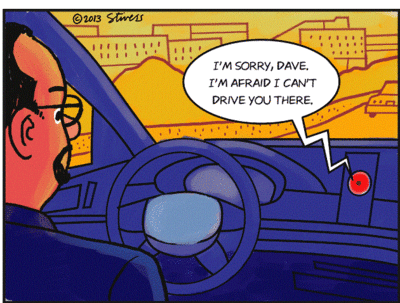New Report: More Americans Agree Self-Driving Cars are Safer Than Texting Drivers
 |
3 out of 4 Americans Agree: A Texting Driver Is More Dangerous Than an AI Driver
STUDY UNVEILS INSIGHT INTO THE STATE OF AUTONOMOUS VEHICLES
AUSTIN, TEXAS (February 28, 2019)-Who do you trust more: Man or machine? According to new data released today by insuranceQuotes.com,<https://www.insurancequotes.com/auto/survey-driverless-cars-safer-texting-drivers-2272019> the answer for most Americans is "machine" - at least when the man in question is distracted. In the second installment of its annual study on consumer perceptions of autonomous vehicles, insuranceQuotes.com revealed that nearly three-quarters (73%) of Americans say that riding in a vehicle where the driver is texting is more dangerous than riding in a self-driving vehicle.
Still, 51% of Americans say their biggest concern about self-driving vehicles is the possibility of technology error or failure. Meanwhile, 22% are most concerned about data security or hacking; 13% are most concerned about job loss in the transportation sector; and 9% worry most about the purchasing cost being unattainable.
"This year's findings speak volumes about distracted driving concerns in America. Even though many Americans express skepticism over the safety of driverless cars, they still would rather put their lives in the hands of a machine before a human that is texting-and those people could be onto something," said Tim Spell, automotive technology analyst at insuranceQuotes.com. "As technology advances, we may well see a day when distracted driving accidents-and traffic accidents in general-plummet thanks to the adoption of autonomous vehicles."
Among the survey's findings:
* 37% of Americans would consider owning or leasing a self-driving vehicle in the future.
* 32% trust the self-driving technology in use today, while 47% expect to trust the technology in 10 years.
* 18-34-year-olds (52%) are most likely to consider owning or leasing a self-driving vehicle, compared to 38% of those 35-44; 39% of those 45-54; 33% of those 55-64; and 22% of those 65 and older.
* 18-34-year-olds (40%) are most likely to trust the self-driving technology in use today, compared to 31% of those 35-44; 32% of those 45-54; 31% of those 55-64; and 23% of those 65 and older.
Millennials and younger generations-who, according to findings, are most inclined to try the technology-have begun paving the road for a future where autonomous vehicles are the norm," said Spell. "Our data suggests that this cultural and technological revolution isn't slowing down any time soon. I would not be surprised if, ten years from now, Americans of every age put their trust in driverless cars without a second thought."
The full report on the survey-which includes additional data, insights and analysis-is available at HERE.
|
|
|
|


